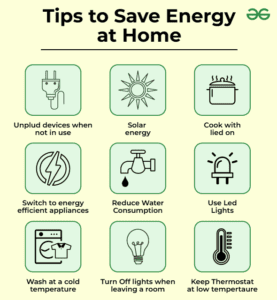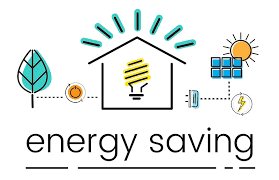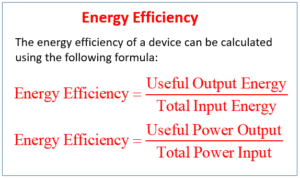Table of Contents
ToggleElectricity Saving Calculations
-
Gather Data:
- Current Energy Usage: Collect information on current electricity consumption from utility bills.
- Appliance Ratings: Identify the wattage or energy rating of appliances and devices in your home.
- Energy Rates: Know the cost of energy per unit (e.g., kWh) from your electricity provider.
- Creating an energy-saving calculator for homes involves calculating potential savings from various energy-efficient upgrades or changes in usage patterns.
- Here’s how you can create one:

Identify Areas of Energy Consumption:
- Lighting: Energy consumption from different types of bulbs (e.g., incandescent, LED, CFL).
- Heating/Cooling: Energy used by HVAC systems, water heaters, and insulation efficiency.
- Appliances: Energy usage of major appliances like refrigerators, washing machines, ovens, etc.
- Electronics: Usage of computers, televisions, and other electronic devices.
- Water Heating: Efficiency of water heaters and potential savings from alternatives like solar water heaters.
3. Calculation Formulas:
- Lighting Savings:
- Savings per bulb = (Wattage of current bulb−Wattage of LED/CFL bulb)/ 100
- Heating/Cooling Savings:
-
- Savings=(Current energy consumption−Energy consumption after upgrade)×Cost per kWh
- Appliance Savings: Savings per appliance=(Wattage of old appliance−Wattage of new appliance1000)×Hours used per day ×Days per year × Cost per kWh
- Water Heating: Savings=(Current water heating cost−Cost with energy-efficient water heater)/100

Implement a Spreadsheet or App:
- Spreadsheet: Use Excel or Google Sheets to create an interactive calculator where users can input their data.
- App: Develop or use existing mobile apps that allow users to input data and calculate savings.
5. Include Additional Factors:
- Insulation Improvements: Calculate savings from better insulation in walls, roofs, and windows.
- Smart Thermostats: Factor in savings from using smart thermostats that optimize heating/cooling.
6. Provide Recommendations:
- Suggest specific upgrades based on the savings potential.
- Offer a comparison of costs versus savings over time to justify investments.

Solar Water Heater Energy Calculation
- Calculating the energy savings from a solar water heater involves comparing the energy used by a conventional water heater with the energy contribution from the solar water heater. Here’s a step-by-step guide on how to do it:
Determine the Hot Water Demand
- Daily Hot Water Usage (in liters)
- Estimate the average amount of hot water used per day (e.g., 100 liters).
- Temperature Rise Required: Calculate the temperature increase needed to heat the water (e.g., from 20°C to 60°C, a rise of 40°C).
Calculate Energy Required by a Conventional Heater:
- The energy needed to heat water can be calculated using the formula
- Energy (kWh) = Volume of Water (liters) ×Temperature Rise (°C)times 4.18 kJ/kg°C/3600
- where:
(4.18 (kJ/kg°C}\) is the specific heat capacity of water. The result is divided by 3600 to convert from joules to kilowatt-hours (kWh).
- Example Calculation:
- Daily hot water usage: 100 liters
- Temperature rise: 40°C
Energy = 100*40*4.18/ 3600} = 4.644 {kWh per day

Estimate Solar Contribution
- Solar Fraction:
- This is the portion of the energy required that is provided by the solar water heater.
- It depends on the system’s efficiency and the local solar insolation (the amount of solar radiation received per square meter).
- System Efficiency: Solar water heaters typically have an efficiency of 50-70%.
- Local Solar Insolation: Find the average solar insolation for your location (measured in kWh/m²/day). This can vary by location and season.
- Example Calculation:*
- Assume solar insolation: 5 kWh/m²/day
- Solar water heater efficiency: 60%
- Solar panel area: 2 m²
- Energy contribution by solar heater:
- Solar Energy Contribution = Solar Insolation ×Panel Area ×Efficiency
Solar Energy Contribution= 5×2 ×0.6 = 6 kWh per day - If the demand is 4.644 kWh, the solar heater can fully cover this requirement, and any excess would be wasted or stored (if storage is available).
Calculate Energy Savings:
- Savings per Day:** If the solar water heater fully meets the hot water demand:
- Daily Savings} = Energy Required by Conventional Heater – Energy Provided by Solar Heater
- If the solar contribution exceeds the demand, the savings equal the energy required by the conventional heater.
- Example Calculation:
– Daily savings: 4.644 kWh/day
– Monthly savings: 4.644 × 30 = 139.32 kWh/month
– Annual savings: 139.32 × 12 = 1,671.84 kWh/year
Consider Additional Factors
- Initial Investment: Compare the initial cost of the solar water heater to the annual savings to determine the payback period.
- Maintenance Costs: Include any maintenance costs for the solar water heater in your calculations.
- This calculation gives a good estimate of the energy and cost savings from using a solar water heater compared to a conventional one.
- If you want, I can help you with more specific calculations based on your location or specific system parameters
Monetary Savings
- Cost per kWh: Multiply the energy savings by the cost per kWh of electricity (or gas) used by the conventional heater.
- Annual Savings: Annual Savings =Annual Energy Savings ×Cost per kWh
- For example, if electricity costs $0.12 per kWh:
- Annual Savings if electricity costs 0.12USD per KWH = 1,671.84 × 0.12 = $200.62 per year
- Consider Additional Factors:
- Initial Investment: Compare the initial cost of the solar water heater to the annual savings to determine the payback period
- Maintenance Costs: Include any maintenance costs for the solar water heater in your calculations.

Conclusion
- This type of calculator helps homeowners make informed decisions about where to invest in energy-efficient technologies to maximize savings.
- Would you like to focus on a particular type of energy-saving measure, such as lighting or heating
- This calculation gives a good estimate of the energy and cost savings from using a solar water heater compared to a conventional one.
- If you want, I can help you with more specific calculations based on your location or specific system parameters
Post Views: 952